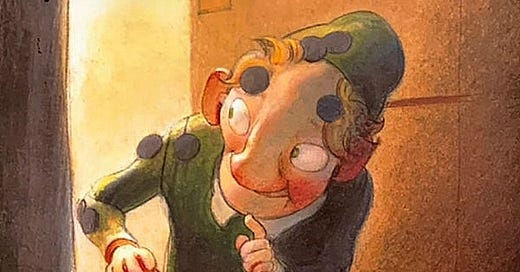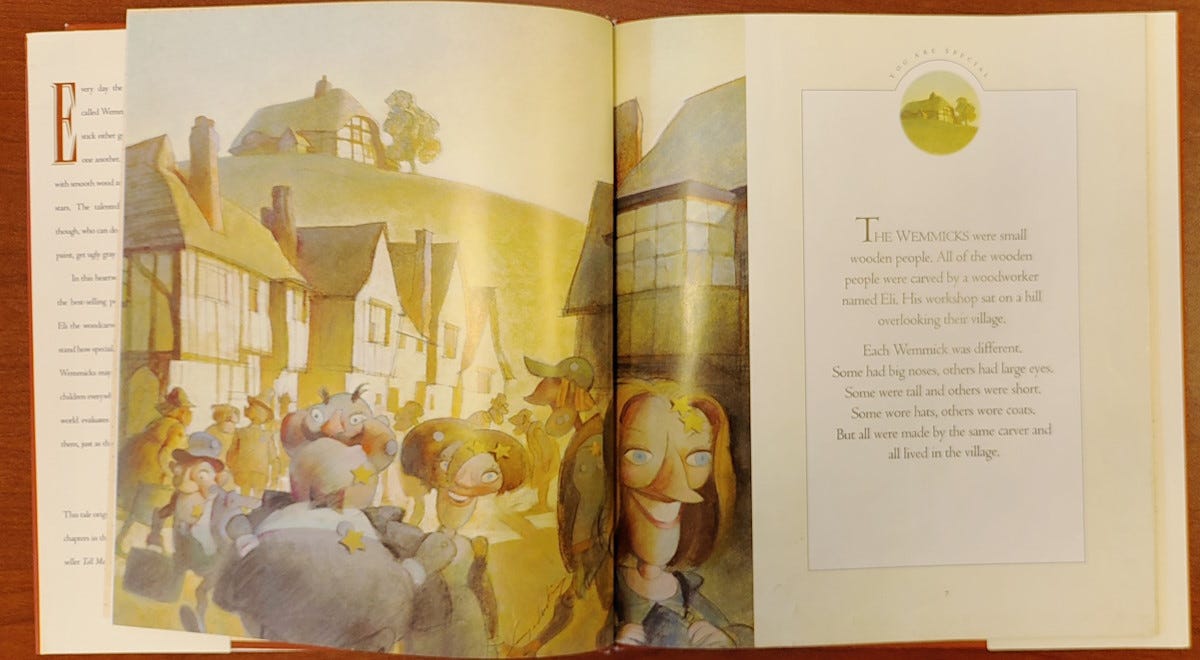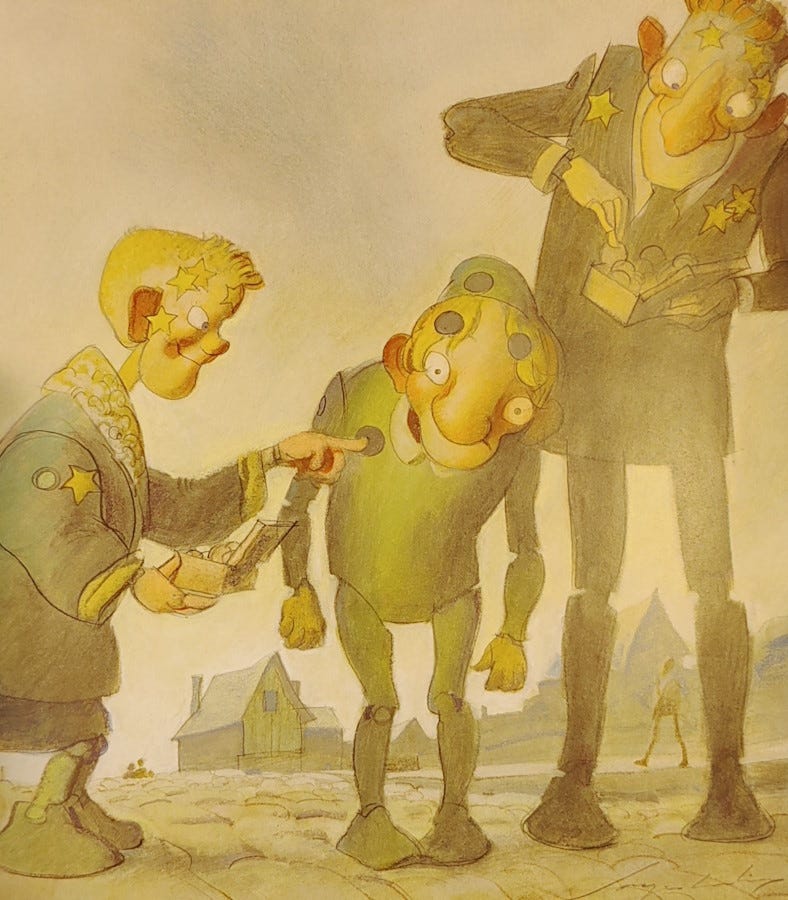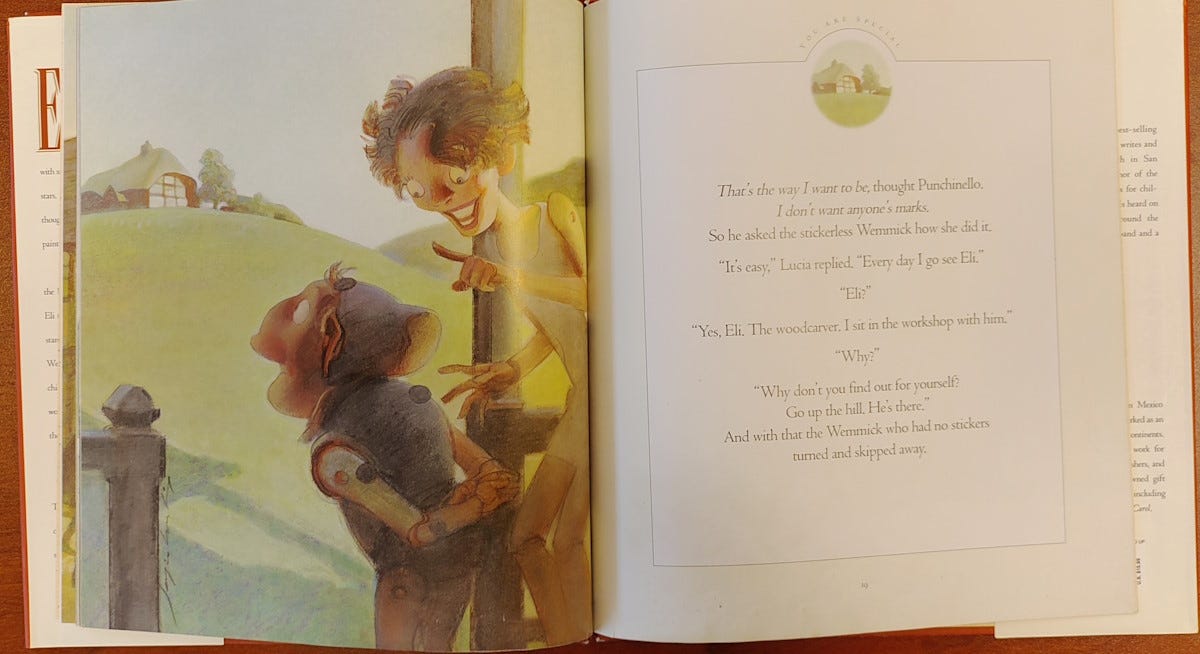An inspiration review of You Are Special by Max Lucado
Looking for emotional, inpletional, confirmational, and motivational inspiration
(If you like this post, bless the Algorithm Angels, the Digital Devas, or whatever you’d like to call them by selecting the “heart” icon ❤️ even if you’re not a subscriber. It helps!)
Several previous posts, such as Genuine spirituality in fiction, part 1, Simplicity vs. sophistication in mystical fiction, part 2, and The nature of inspiration, part 4, have referred to Max Lucado’s children’s book, You Are Special, as an excellent example of a “simple devotional story that inspired people to seek God.” Although these other posts here already reviewed the story somewhat, I wanted to look at it again with a specific eye to the kinds of inspiration it delivers.
I can’t reproduce the entire book here, of course, but you can use the video below for a read-through that shows the text as well as the illustrations.
Story overview
First, a quick synopsis: You Are Special is set in Lucado’s world of the Wemmicks, who are wooden people created by a woodcarver named Eli who lives on the top of a hill above the Wemmick’s village. Eli clearly represents God, as the Creator, and the Wemmicks represent us, God’s human creations.
The Wemmicks spend most of their time giving each other stars (praise) or dots (criticism); some have many stars while others, like the protagonist, Punchinello, have nothing but dots. Punchinello, consequently, questions his self-worth as a Wemmick, until he meets a Wemmick named Lucia who has no stars or dots at all. How does she do it? It’s simple, she says: just go spend time with Eli.
Punchinello hesitates, but finally chooses to go and discovers that Eli cares for him regardless of stars or dots. Eli also shares a secret: the stars and dots only stick if you let them, and the easiest way to transcend all that is to simply come and visit Eli every day. The moment Punchinello accepts Eli’s love, one of his dots falls off.
Let’s now look at the inspiration delivered at different points in the story, which are confirmational, inpletional, and motivational. As we’ll see, there’s little in the way of purely emotional inspiration because the book isn’t intended to excite. When feeling is involved, it’s the deeper feeling of inpletional inspiration, which alone gives You Are Special a clearly spiritual quality.

Opening (pages 6-11)
Pages 6-11, illustrations and text included, introduce the Wemmicks and how they go around giving each other star or dot stickers. These opening pages are forms of confirmational inspiration because they portray, very simply and directly, a general pattern of human behavior in which we often judge each other based on worldly standards of success and failure. The Wemmicks, in other words, are just like us. When reading these pages, then, we are likely to nod our heads and say, “Yep, life is a lot like that.”
The illustrations, too, are important: they show a wide assortment of Wemmicks wherein most readers can probably find one with whom they identify, making the story relatable.
When we learn about the Wemmicks giving each other stars and dots, we have the first inkling of an emotional connection, for all of us have had experiences of receiving praise and blame from others. The stars might remind us of the emotional highs of being praised, just as the dots remind us of the emotional lows of criticism.
Introducing Punchinello (pages 12-15)
Now we meet Punchinello (pages 12-15), whose name suggests a punching bag, which is to say, the butt of jokes. He’s got nothing but dots, which is probably how most people feel, even if they get a few stars here and there. We can see ourselves in Punchinello, in other words, making a bit of an emotional connection but also provides that bit of confirmational inspiration as well.
Together with the opening, this introduction of Punchinello and his plight is likely to hook most readers so that they want to know what happens. His story is our story.
Punchinello meets Lucia (pages 16-19)
Punchinello now meets Lucia, a Wemmick who seems unique in Punchiello’s view because: not only does she have no dots, she doesn’t have any stars, either. She is just her own self. She has realized the truth that praise doesn’t make you, in that true self, any better, nor does blame make you any worse. Why, then, heed either?1
As the story says, “It wasn’t that people didn’t try to give her stickers, it’s just that the stickers didn’t stick.” In this way, Lucia represents a person who has transcended the ego, which is that aspect of human consciousness that clings not only to praise but also to blame. Usually we think of egotism as having a puffed-up sense of self, but egotism is equally present in self-deprecation or a shattered sense of self. True humility isn’t self-deprecation, it’s self-forgetfulness.
Punchinello is inspired by Lucia’s example. His thoughts are ours: “That’s the way I want to be. I don't want anyone's marks.” This is a first inkling of motivational inspiration—the inner clarity that says, “The purpose of life isn’t to get stars and avoid dots—it’s to transcend them altogether.”
He thus asks Lucia how she does it, which means Punchinello is taking the first step to that second element of motivational inspiration: a greater awareness about how to go about living with the inner clarity of what life is about. His inquiry indicates that he’s interested in other possibilities, that he’s opening himself to a potential change.
And her answer is very simple: just go up the hill to see Eli.
Go up the hill—go see your Maker every day. That's the secret. But Lucia can’t make this choice for Punchinellio: he has to make it for himself, as does every person.
In this scene, then, Punchinello has gained some clarity on what life is about, and he knows what he needs to do. The will and courage to do so, however, isn't yet there.
Punchinello decides to visit Eli (pages 20-21)
“But will he want to see me?” Punchinello has self-doubt, which is confirmational inspiration for us. We’ve all been there, haven’t we? Such doubt blocks will and courage. So, Punchinello hesitates. But as he watches the Wemmick’s go about business as usual, handing out stars and dots, he deepens that sense of clarity within himself: “It’s not right.” And he decides to go see Eli.
He decides. The inner clarity and knowing of how is now backed with will and courage. If we've identified with Punchinello, then perhaps were starting also to think, "No matter how broken others may think I am, I'm still going to do this."
Punchinello visits Eli (pages 22-29)
Lucia’s example has clearly motivated Punchinello to make a change, even if it’s just taking the first tentative step to go up the hill. But action of any kind moves energy, and here Punchinello is willfully, and courageously, moving energy in the direction of becoming like Lucia, in the direction of transcending ego.
When Punchinello first enters Eli’s workshop, he’s a bit overwhelmed. He’s about to lose courage and turn tail when he hears Eli calling his name. Punchinello is surprised, but delighted, making for an emotional moment that touches the heart, a form of inpletional inspiration. We get more of this, too, when Eli observes all of Punchinello’s dots but nevertheless affirms Punchinello’s inherent worth:
Eli stooped down and picked him up and set him on the bench. “Hmm,” the maker spoke thoughtfully as he looked at the gray dots. “Looks like you've been given some bad marks.”
“I didn't mean to, Eli. I really tried hard.”
“Oh, you don't have to defend yourself to me, child. I don't care what the other Wermmicks think.”
“You don’t?”
“No, and you shouldn't either. Who are they to give stars or dots? They're Wemmicks just like you. What they think doesn't matter, Punchinello. All that matters is what I think. And I think you are pretty special.”
This inpletional moment is nicely illustrated in the book: Punchinello is glowing in the realization that he’s loved. He knows—as do we, by extension—that his choice to come see Eli was the right one.
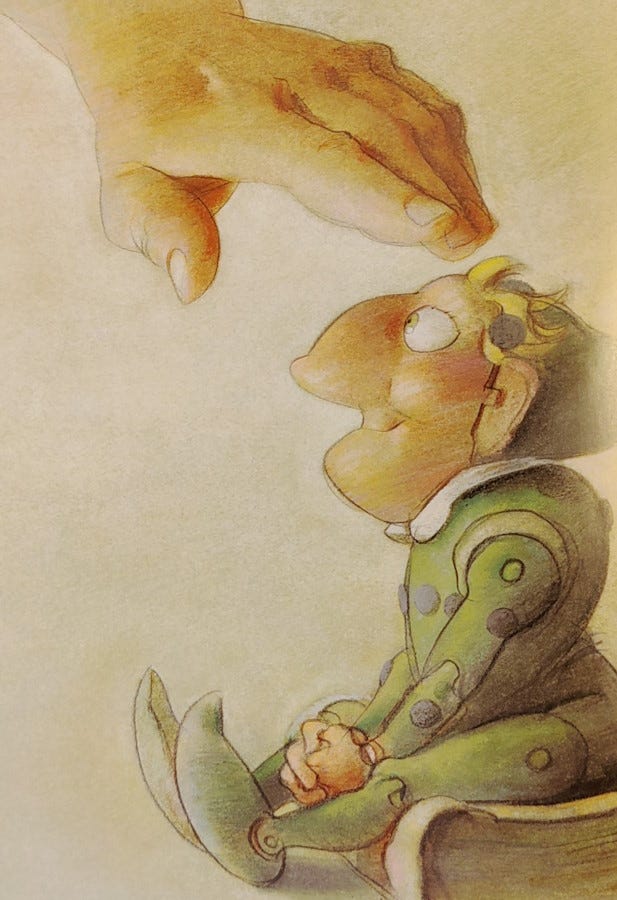
The conclusion (pages 28-31)
The story concludes now with Eli saying that he’d hoped Punchinello would come, an acknowledgement that no matter what Punchinello thought of himself, Eli always knew that the Wemmick had the power, like Lucia, to transcend the ego. That’s when Eli shares the secret:
“The stickers only stick if they matter to you. more you trust my love. the less you care about their stickers.”
The message here is simple: don’t worry about other people’s opinions. Care more about what your Maker thinks.
Punchinello, of course, reflects our own response to this idea: he isn't sure he understands. Eli assures him that he will, in time. But “For now…”
“…just come to see me every day and let me remind you how much I care.”
Punchinello’s closing through is, “I think he really means it,” and that’s when a dot falls off, a gratifying little surprise that Lucado keeps until the very end.
The story thus ends with a moment of deep feeling wherein we know that something, however, small, has changed inside Punchinello. He’s taken a step toward inner freedom, to attune to Eli rather than Wemmicks’ opinions. And perhaps we even get a lump in the throat because we’re left with the realization that we, too, even if we think we’re covered in dots, could make the same decision and experience that same transformation.
A side note: even though Punchinello is covered with dots, the story also works for one who is covered with stars and inflated with pride rather than the false humility of self-debasement. It might be harder for a many-starred person to choose to see Eli, for whereas receiving dots leaves you feeling lousy, receiving stars gives you emotional inspiration. Yet such inspiration is short-lived. In time, the stars—and the quest to receive more of them—become just as burdensome as dots, even more so because you can become a slave to maintaining an image. In the end, the solution to overcoming pride is the same as that to overcome shame: relinquish the ego by spending time with God rather than people’s opinions.
The inspiration to seek God
Punchinello’s story, by giving us the opportunity to make the same choice, offers clear motivational inspiration.
First, we have the inner clarity that the purpose of life is not to please man but to spend time with God, to know God.
Second, we know what to do: just spend some time with God every day. Visit with him—in loving prayer and inner communion. Just you and God. Intimate rather than formal, personal rather than social, without shame or judgment or recrimination.
Third, we have the will and courage—well, we have to decide that, but Lucado has made it easy. Just speed time with God every day. That's it. You can do this, yes?
I think it’s important to also note what Eli did not say. He did not instruct Punchinello to preach, evangelize, and go out and save souls, any more than he asked of Lucia. Lucia was just herself, providing a living example one whose ego has diminished through her devotion to God, an example that draws and inspires those who, like Punchinello, are ready for this step of communion with God.
Furthermore, Eli didn’t ask Punchinello to attend church, go to a Bible study, change his career, dress differently, learn a new talent, give money, hold certain political opinions, talk about Eli to others, or even “believe” anything. None of that. He asked only one thing: “Just come and see me every day, and let me remind you how much I care.” That’s it. Tune into God and God’s love. Daily connection, which, one must assume, forges a deeper, ongoing connection as well, so that you stop worrying about what others think: you care only about God's smile in your heart. Various outward changes will certainly follow from that inner attunement, but Eli is saying to start within yourself, rather than trying to work from the outside-in.
In short, You Are Special is a simple, devotional story, just over 1000 words in all, that delivers the motivational inspiration to seek God, to seek to spend time communing with Him. It’s devotional because Lucia provides the example of one who has made space for God in her life, in her heart (not caring what other Wemmick’s think), in her mind (keeping Eli there instead of thoughts about others opinions), and in her strength/energy by deliberately going to see Eli every day.
She is fulfilling Jesus’ first commandment, and because Punchinello has also started on that path, so can we.
(If you like this post, bless the Algorithm Angels, the Digital Devas, or whatever you’d like to call them by selecting the “heart” icon ❤️ even if you’re not a subscriber. It helps!)
I note that although the story describes stars in the context of being praised for one’s talents, the concept applies equally to the praise we give to people who are serving in some capacity, such as charitable or social work.


